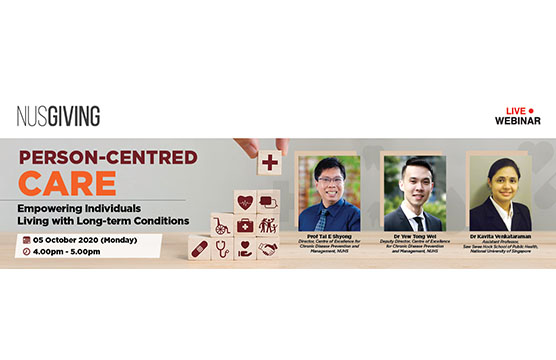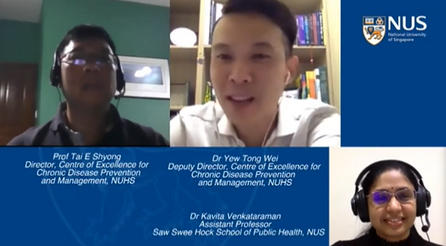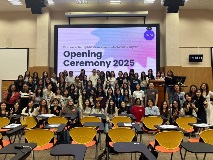The healthcare system was designed at a time when the greatest need was for acute episodic conditions but with the rise of long-term conditions, the challenge is to re-design and re-engineer

Today, non-communicable, long-term conditions (LTCs) are the main contributors to ill-health and premature death. Yet, Singapore’s healthcare system, like those in most countries, was designed at a time when the greatest need was care for acute episodic conditions.
During the National University of Singapore (NUS) Giving Webinar titled Person-centred Care: Empowering Individuals Living with Long-term Conditions, a panel of healthcare experts gathered to share on the whys and hows of person-centred care.
“In countries where the population has limited access to healthcare, a small increase in healthcare funding that increases access to healthcare services can have a large impact on the health of the population. However, in developed countries, an increase in healthcare expenditure does not necessary translate to an increase in health-adjusted life expectancy. Spending more money on the problem by doing more of the same thing, sometimes, does not produce the results that you want. What we really need to do is to change the way care is delivered to increase efficiency,” highlighted Prof Tai E Shyong, Director, Centre of Excellence for Chronic Disease Prevention and Management, National University Healthy System (NUHS).
Now, the challenge is to re-design and re-engineer the healthcare system to support those living with LTCs, to help them identify what matters most in their own lives, which may not be the same as the priorities for the healthcare system or the providers. In this way, healthcare providers can work with patients to develop an action plan that would help them achieve their own aspirations and needs.

According to Prof Tai, studies have revealed that the major burden of diseases in Singapore has shifted from acute conditions to chronic diseases over the years, with diabetes being one of the most significant condition. Successful treatment of diabetes requires the patient to make changes in many aspects of his/her life ranging from the foods they eat, to the amount of activity that they undertake, to taking medications or injections regularly. These changes compete with other priorities in their lives such as providing a home and financial stability for their family, their relationships with friends, families and their community, rest and recreation. Sometimes these priorities conflict with each other and it is not surprising that many patients struggle to make the changes required to optimise their health. It is important to recognise that often times, when a patient does not do the things they are asked to do, this does not represent a failure on their part, but on the part of the healthcare system to engage them and provide treatment options that are meaningful to the patient and meets their needs and aspirations.
“Faced with an ever-increasing workload, there is often a temptation for doctors to focus on the disease at the cost of the individual. In this context, person-centred care aims to restore the balance between the provider and the recipient by respecting people with disease and their right to make informed decisions about their care,” explained Dr Kavita Venkataraman, Assistant Professor, Saw Swee Hock School of Public Health, NUS.
Before passing the floor to the next speaker, Prof Tai posed a question: “This is all very nice in theory but is it actually possible to change anything? How can we make care more person-centred?”
“What we want to do is to transform consultations into meaningful conversations with the patients to lead to effective changes,” remarked Dr Yew Yong Wei, Deputy Director, Centre of Excellence for Chronic Disease Prevention and Management, NUHS.
“We view consultations much like the meeting of two experts. The patient (an expert in his/her own life) and health care provider (an expert in the medical aspects) are meeting at equal levels to share information, discuss agendas and formulate action plans for the individuals to live better with diabetes,” Dr Yew shared.
Dr Yew also touched on the process of person-centred care, where patients partner with health care providers in identifying their personal goals, jointly developing, committing to and adopting a sustainable action plan that supports self-management between medical appointments, and more importantly, throughout their lives.
In Singapore, person-centred care can become the standard operating procedure for patients with chronic diseases.
“The NUHS is not just about hospitals and clinics but more importantly, it integrates a whole series of academic institutions – the School of Medicine, the Nursing Institute, the Faculty of Dentistry and the School of Public Health. The work that we do in the Schools translates directly to the people who will run the healthcare system in the future. Hence when there is a need to modify the healthcare system, we’re actually able to do that. That is the advantage that we have, on being part of an academic medical system such as the NUHS,” affirmed Prof Tai.
For further information on the NUS Greater Good Series, contact the Events team at dvoevents@nus.edu.sg.






